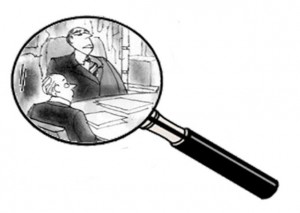Who is supervising the IAEA, the EU, the World Bank,
the world’s stock exchanges and the big banks?
Roman poet Juvenal asked:
“Quis custodiet ipsos custodes? (“Who will guard the guards?”).

And in 1887 Lord Acton, in a letter to Bishop Mandell Creighton, wrote:
“Power tends to corrupt, and absolute power corrupts absolutely. Great men are almost always bad men.”
The system of checks and balances in the U.S. Constitution is intended to minimize the danger of granting unlimited power to fallible humans.
The VW scandal following hard on the heels of the FIFA revelations and all too many other recent major scams reminds us that even the most highly placed and respected person is not infallible.
There can be no doubt that unless adequate regulatory mechanisms are instituted we must be prepared for more dangerous abuses of power.
Controversy has arisen since Republican Senator Tom Cotton of Arkansas and Congressman Mike Pompeo of Kansas disclosed the existence two secret deals between the IAEA and Iran, the contents of which are unknown even to Secretary Kerry. It is incomprehensible that the world appears to be unconcerned about the blatant lack of transparency in the IAEA, the body responsible for ensuring implementation of the nuclear non-proliferation treaties with more than 30 countries.
That inspections by fallible human IAEA inspectors need to be supervised is highlighted in a report by Henry Sokolski, executive director of Washington-based Non-proliferation Policy Education Center, who said that he was told of observation cameras often being out of commission in one country under supervision . So much for 24/7 surveillance.
Iran is not supposed to receive sanctions relief under the nuclear deal until the IAEA is satisfied it has answered outstanding questions about the so-called “possible military dimensions” in particular at the Parchin site. IAEA access to this site was a prominent issue during the negotiations that led to the nuclear deal and the subsequent revelation about a confidential deal for this site has led to wide concern.
On September 18, Reuters reported that several nuclear security experts, experienced in international weapons inspections, were urging the release of details of how Parchin was to be inspected. They said failure to disclose the details was damaging the credibility of the IAEA
David Albright, head of the Institute for Science and International Security in Washington said “Whatever the outcome of the sampling, the secrecy makes it harder to determine whether it’s a credible sampling approach.”
Contrary to top level assurances of unsurpassed surveillance, Iran’s English economic daily, the Financial Tribune, reported on the unprecedented concession which had been revealed permitting the Iranians to take their own samples from the Parchin site. This was however conditional on the samples being taken in the presence of IAEA experts to observe and oversee the process. Four diplomats familiar with the deal told Reuters that UN inspectors would be present at Parchin to oversee the inspections. The samples would be taken by Iranian technicians while IAEA experts present at Parchin observe and oversee the process.
According to CNN of September 21, a senior U.S. State Department official said that the IAEA would have “total oversight” of sampling and inspections of Parchin.
But when IAEA director-general Yukiya Amano visited Parchin on September 20, he discovered that in flagrant violation of the condition that IAEA inspectors be present, the samples had been taken by Iranians the day before his arrival.
In the circumstances, the casualness with which Mr. Amano’s September 21 statement that neither he nor any IAEA inspector was present when the samples were taken should raise major concerns among all who are interested in the successful implementation of the JCPOA.
It is difficult to understand how Mr. Amano could report that he is satisfied with the manner in which the samples were taken. It indicates that, in effect, the responsibility for averting the danger to the world of nuclear proliferation rests ultimately on the judgment of one fallible human, the director general of the IAEA
It is interesting that there is nothing in the IAEA statute that authorizes secret agreements and the revelation that many such secret agreements exist calls for an urgent meeting of the IAEA board of governors and questions about the methodology and effectiveness of IAEA inspection of all the NPT countries. The question also arises as to what criteria apply to the need for secret agreements and who authorizes and ratifies them.
President Obama himself has stressed the vital importance of transparency. In a memorandum signed by the president and published on the White House website, titled “Transparency and Open Government”, the president declares
“My Administration is committed to creating an unprecedented level of openness in Government.. Transparency promotes accountability and provides information for citizens about what their Government is doing. My Administration will take appropriate action, consistent with law and policy, to disclose information rapidly in forms that the public can readily find and use. “
If future disputes are to be avoided and indeed if the JCPOA is to be capable of implementation, the secret agreements must be attached to the JCPOA as appendices and provide that the JCPOA with such appendices constitute the entire agreement between the parties and constitutes and supersedes all prior agreements, representations and understandings of the parties, written or oral. Unless this provision is made severe misunderstandings are bound to arise in the implementation of the agreement and possibly even its breakdown.
